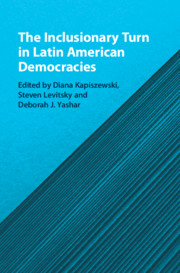Book contents
- The Inclusionary Turn in Latin American Democracies
- The Inclusionary Turn in Latin American Democracies
- Copyright page
- Contents
- Figures
- Tables
- Contributors
- Acknowledgments
- Prologue: Reflections on Two Episodes of Popular Inclusion
- 1 Inequality, Democracy, and the Inclusionary Turn in Latin America
- Part I Extending Social Policy and Participation
- 2 Including Outsiders in Latin America
- 3 Diffusion Dynamics
- 4 Inclusion Without Power?
- 5 Brazil’s Participatory Infrastructure
- Part II Inclusion and Partisan Representation
- Part III New Party–Society Linkages
- Part IV Inclusion, Populism, and Democracy
- References
2 - Including Outsiders in Latin America
from Part I - Extending Social Policy and Participation
Published online by Cambridge University Press: 12 January 2021
- The Inclusionary Turn in Latin American Democracies
- The Inclusionary Turn in Latin American Democracies
- Copyright page
- Contents
- Figures
- Tables
- Contributors
- Acknowledgments
- Prologue: Reflections on Two Episodes of Popular Inclusion
- 1 Inequality, Democracy, and the Inclusionary Turn in Latin America
- Part I Extending Social Policy and Participation
- 2 Including Outsiders in Latin America
- 3 Diffusion Dynamics
- 4 Inclusion Without Power?
- 5 Brazil’s Participatory Infrastructure
- Part II Inclusion and Partisan Representation
- Part III New Party–Society Linkages
- Part IV Inclusion, Populism, and Democracy
- References
Summary
This chapter analyzes the dramatic expansion of social policy to traditionally unprotected labor-market outsiders (i.e. the informal sector, unemployed, rural workers and dependents) in Latin America. Comprising between 40 and 80 percent of the regional population, outsiders had been historically marginalized from social protection. Focusing on the countries analyzed in Shaping the Political Arena (Collier and Collier 1991) it asks, why did incumbents adopt social policy for outsiders? Why did some expand broad-reaching, nondiscretionary benefits while others refrained from launching significant protections or launched discretionary benefits? The political regime type as well as the presence of either electoral competition for the vote of outsiders or social mobilization by movements representing outsiders and labor unions help explain whether expansion occurred and what pattern of social policy emerged. Moreover, among governments that expanded nondiscretionary and broad-reaching policies, some created more generous and encompassing inclusive benefits in which groups often participated in policy implementation, while others provided more restrictive benefits, with less coverage, lower benefits, and bureaucratic implementation. I show that the balance of partisan power and the involvement of social movements in policy design accounts for whether inclusive or restrictive benefits were launched across three areas – pensions, healthcare, and income support.
- Type
- Chapter
- Information
- The Inclusionary Turn in Latin American Democracies , pp. 59 - 92Publisher: Cambridge University PressPrint publication year: 2021
References
- 3
- Cited by

